X
wikiHow is a “wiki,” similar to Wikipedia, which means that many of our articles are co-written by multiple authors. To create this article, volunteer authors worked to edit and improve it over time.
Learn more...
Fish are animals that can get stressed easily. Stress weakens their immune systems and leaves them vulnerable to infections and parasites, some of which are incurable. For this reason, keeping your fish clear of stress will lead to healthier fish. Read this article to find out how to prevent stress in fish.
Steps
-
1Give your fish plenty of space. Just because a fish is small does not mean it can live in a small tank. All fish like to have more room to swim around, as this matches their natural environment. Try to buy the largest fish tank you can, keeping budget and other considerations in mind. Research how much space is suggested for your fish and aim for a tank larger than the minimum recommended size. For most species of fish, the more size they have to swim the better.
-
2Do not overstock your aquarium. In addition to giving your fish plenty of space, do not add too many fish to one tank. Overcrowding can quickly stress fish out due to bullying, lack of space, or changes in water quality. Know how much space each of your fish requires and make sure your filtration system can handle the bioload of every fish.Advertisement
-
3Keep the water quality stable. A clean environment is essential for keeping your fish healthy and stress-free. Having a tank with high ammonia or nitrate levels can result in diseases and death. Make sure your aquarium is properly cycled and use a liquid water test kit to keep track of your water quality. Sudden or large changes can stress your fish or lead to worse problems.[1]
- An aquarium filter helps keep the water clean and helps maintain the nitrogen cycle. Make sure your aquarium filter has the right filtration for your tank.
-
4Provide plenty of hiding spaces. Smaller fish might become stressed due to large open areas or other tankmates that live with them. By giving your fish plenty of places to retreat if they feel threatened, you can reduce their stress as well.[2] Live plants, rocks, and aquarium decor like caves or hollow logs are perfect for adding cover to your tank.
-
5Give your fish a friend. Some fish require being with others of their own kind or any other kind of fish to be healthy and free of stress. This is especially true for fish that live in schools, such as most tetras and Danios.[3] Research online or check with a local aquarist to see whether your fish requires a schooling environment.
- If your fish likes to school or shoal with other fish, you will likely need at least five others to help them feel comfortable. Make sure you have the space to house these extra fish beforehand.
- Not all fish need friends. Some fish, like Bettas, either need to be kept alone or strongly prefer a solitary environment. There are other ways to provide enrichment for these fish besides trying to give them unwanted friends.
-
6Make sure there is no excessive aggression among your fish. Some fish are, unfortunately, natural bullies and will spend their time harassing other fish. Keep an eye out for fish being chased, fish nipping others and red marks or torn fins from fighting. The bullied fish will quickly become stressed if this behavior is an ongoing problem.[4] Keep plenty of decor to break up sight lines and provide hiding spots for your fish. Remove or rehome fish that are consistently a problem.
-
7Offer your fish a varied diet. Although your fish can survive off of simple flakes and pellets, giving a variety of other foods as snacks can help vary their diet. Many fish will also eat live and frozen food, such as bloodworms and certain vegetables. Supplementing their diet with fresher foods than just fish flakes can improve your fish's nutrition, leading to a more healthy pet.[5] Conduct research on your fish to see what is safe to feed it.
- If you have multiple fish, make sure all of your fish are getting enough to eat. Ensure none of them are getting bullied out of eating enough and that none of them are overeating.
-
8Have the correct lighting. Most fish don't enjoy having especially bright lights, so make sure the lighting in your aquarium isn't too strong. Turn off the lights at night to give your fish time to rest and to simulate a day/night cycle. Some fish might sleep throughout the day, but many fish sleep at night like us. Likewise, some fish prefer darker environments or only come out at night. Turning the lights off allows them to explore their tank without feeling stressed.
-
9Don't clean your tank too frequently. Keeping your tank free of waste and toxins is an important part of any tank. Conduct weekly water changes, changing at least 50% of the water. However, do not perform water changes more than three times a week, as the repeated change in environment increases stress levels in fish.
Advertisement
Warnings
- Do not allow the pH or ammonia levels of your tank to grow too high. These factors, along with nitrite and nitrate levels, can kill your fish if left for long periods of time.⧼thumbs_response⧽
- Never mix fish that are incompatible together.⧼thumbs_response⧽
- Avoid overfeeding fish, as this can lead to bloating and death. Many fish do not stop eating even after the need to eat is satisfied, so only feed your fish as much as directed.⧼thumbs_response⧽
Advertisement
References
- ↑ https://www.ratemyfishtank.com/blog/tips-for-spotting-signs-of-distress-in-your-fish-before-its-too-late
- ↑ https://www.allpondsolutions.co.uk/fishkeeping-advice/fish-stress.html
- ↑ https://www.liveaquaria.com/article/88/?aid=88
- ↑ https://be.chewy.com/how-to-tell-if-your-aquarium-fish-is-stressed/
- ↑ https://cafishvet.com/fish-health-disease/stress-in-fish/
About This Article
Advertisement


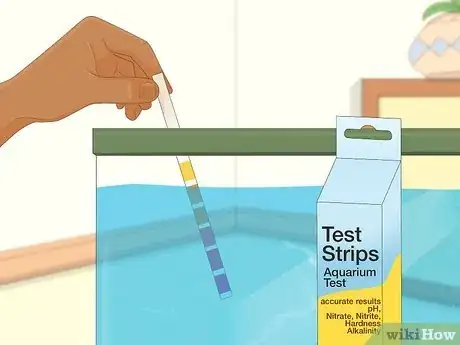
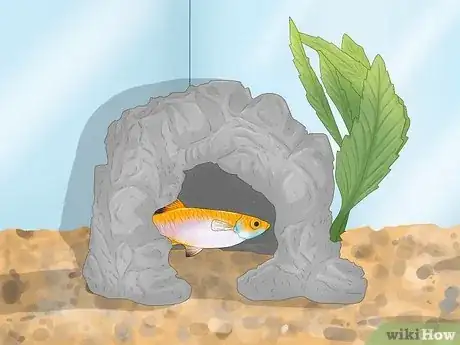



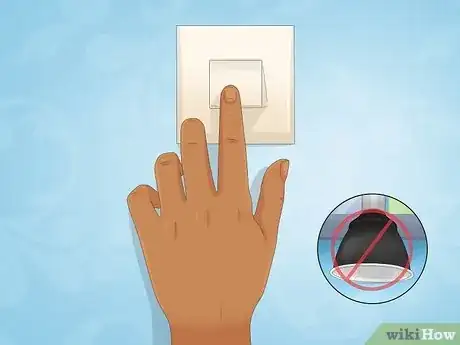
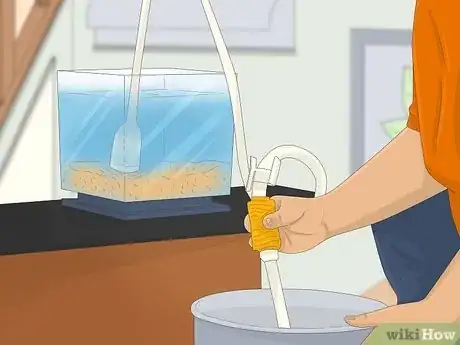
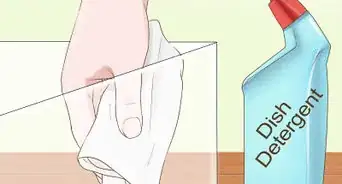






-Step-16.webp)



















































